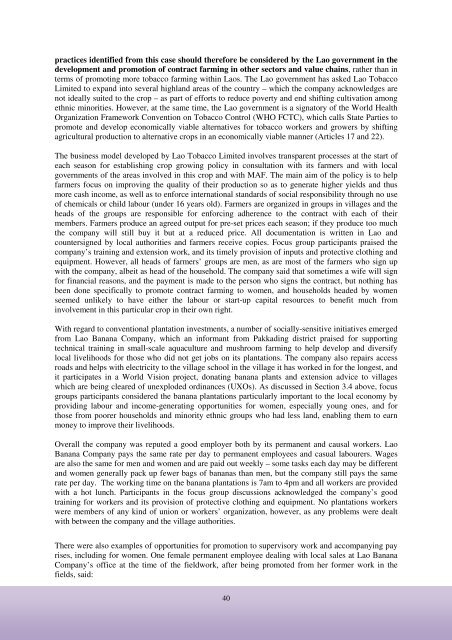6gEvuX
6gEvuX
6gEvuX
Create successful ePaper yourself
Turn your PDF publications into a flip-book with our unique Google optimized e-Paper software.
practices identified from this case should therefore be considered by the Lao government in thedevelopment and promotion of contract farming in other sectors and value chains, rather than interms of promoting more tobacco farming within Laos. The Lao government has asked Lao TobaccoLimited to expand into several highland areas of the country – which the company acknowledges arenot ideally suited to the crop – as part of efforts to reduce poverty and end shifting cultivation amongethnic minorities. However, at the same time, the Lao government is a signatory of the World HealthOrganization Framework Convention on Tobacco Control (WHO FCTC), which calls State Parties topromote and develop economically viable alternatives for tobacco workers and growers by shiftingagricultural production to alternative crops in an economically viable manner (Articles 17 and 22).The business model developed by Lao Tobacco Limited involves transparent processes at the start ofeach season for establishing crop growing policy in consultation with its farmers and with localgovernments of the areas involved in this crop and with MAF. The main aim of the policy is to helpfarmers focus on improving the quality of their production so as to generate higher yields and thusmore cash income, as well as to enforce international standards of social responsibility through no useof chemicals or child labour (under 16 years old). Farmers are organized in groups in villages and theheads of the groups are responsible for enforcing adherence to the contract with each of theirmembers. Farmers produce an agreed output for pre-set prices each season; if they produce too muchthe company will still buy it but at a reduced price. All documentation is written in Lao andcountersigned by local authorities and farmers receive copies. Focus group participants praised thecompany’s training and extension work, and its timely provision of inputs and protective clothing andequipment. However, all heads of farmers’ groups are men, as are most of the farmers who sign upwith the company, albeit as head of the household. The company said that sometimes a wife will signfor financial reasons, and the payment is made to the person who signs the contract, but nothing hasbeen done specifically to promote contract farming to women, and households headed by womenseemed unlikely to have either the labour or start-up capital resources to benefit much frominvolvement in this particular crop in their own right.With regard to conventional plantation investments, a number of socially-sensitive initiatives emergedfrom Lao Banana Company, which an informant from Pakkading district praised for supportingtechnical training in small-scale aquaculture and mushroom farming to help develop and diversifylocal livelihoods for those who did not get jobs on its plantations. The company also repairs accessroads and helps with electricity to the village school in the village it has worked in for the longest, andit participates in a World Vision project, donating banana plants and extension advice to villageswhich are being cleared of unexploded ordinances (UXOs). As discussed in Section 3.4 above, focusgroups participants considered the banana plantations particularly important to the local economy byproviding labour and income-generating opportunities for women, especially young ones, and forthose from poorer households and minority ethnic groups who had less land, enabling them to earnmoney to improve their livelihoods.Overall the company was reputed a good employer both by its permanent and causal workers. LaoBanana Company pays the same rate per day to permanent employees and casual labourers. Wagesare also the same for men and women and are paid out weekly – some tasks each day may be differentand women generally pack up fewer bags of bananas than men, but the company still pays the samerate per day. The working time on the banana plantations is 7am to 4pm and all workers are providedwith a hot lunch. Participants in the focus group discussions acknowledged the company’s goodtraining for workers and its provision of protective clothing and equipment. No plantations workerswere members of any kind of union or workers’ organization, however, as any problems were dealtwith between the company and the village authorities.There were also examples of opportunities for promotion to supervisory work and accompanying payrises, including for women. One female permanent employee dealing with local sales at Lao BananaCompany’s office at the time of the fieldwork, after being promoted from her former work in thefields, said:40


